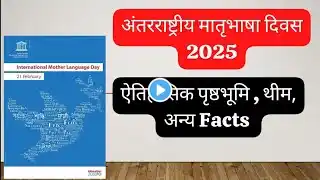
International Mother Language Day | History trivia
International Mother Language Day, first proclaimed by UNESCO and later adopted by the UN General Assembly, underscores the role of languages in promoting inclusion and achieving Sustainable Development Goals. Multilingual education not only promotes inclusive societies but also aids in preserving non-dominant, minority, and indigenous languages. It is a cornerstone for achieving equitable access to education and lifelong learning opportunities for all individuals. Languages are essential to education and sustainable development, serving as the primary means through which knowledge is transferred and cultures are preserved. With approximately 8,324 languages in the world today, many are at risk of disappearing due to globalization and societal changes. Ensuring that education systems support the right to learn in one's mother tongue is crucial for improving learning outcomes, as students who are taught in a language they fully understand show better comprehension, engagement, and critical thinking skills. Multilingual education, particularly for minority and indigenous languages, not only helps learners but also fosters a deeper connection between education and culture, contributing to more inclusive and equitable societies. - UN



















